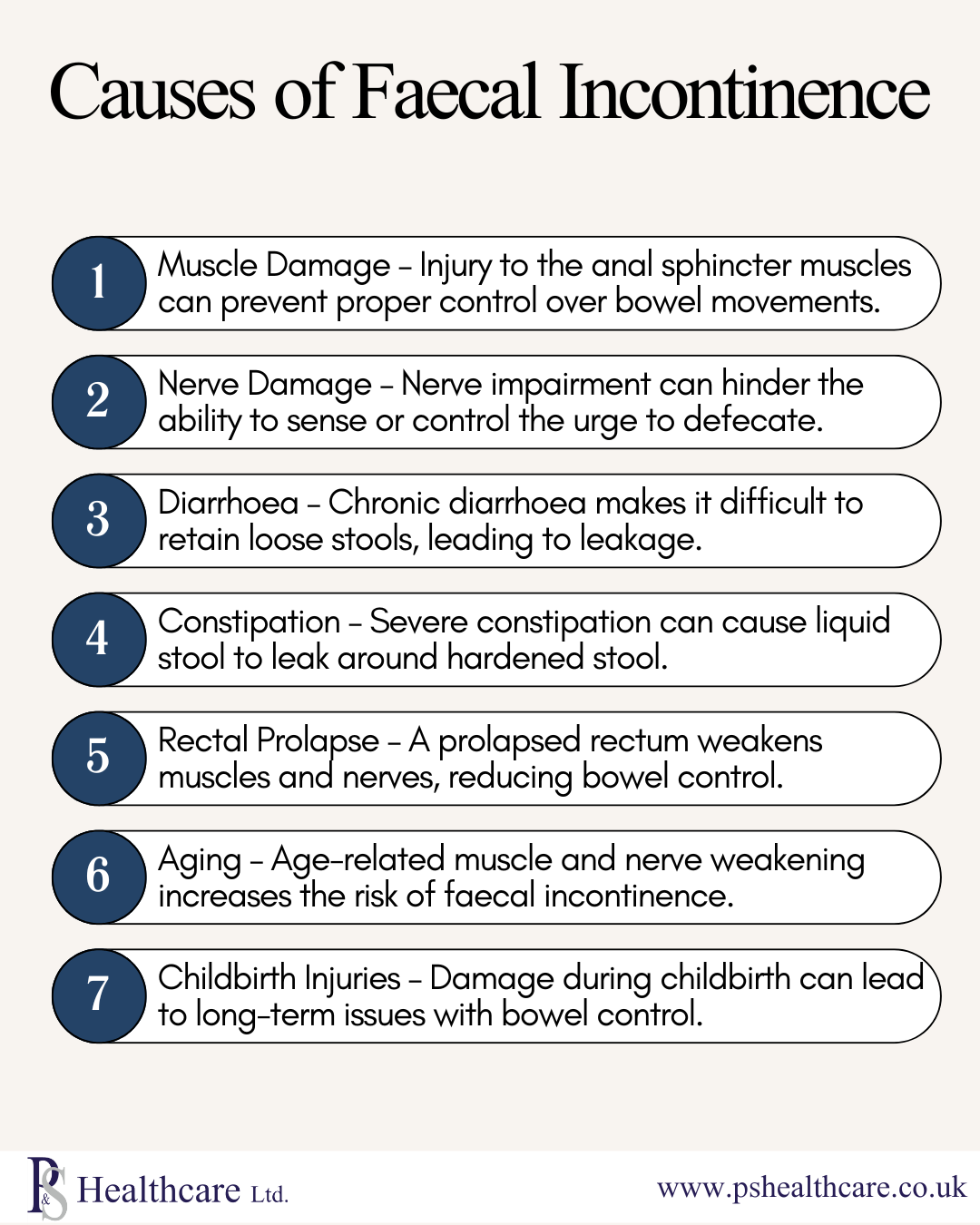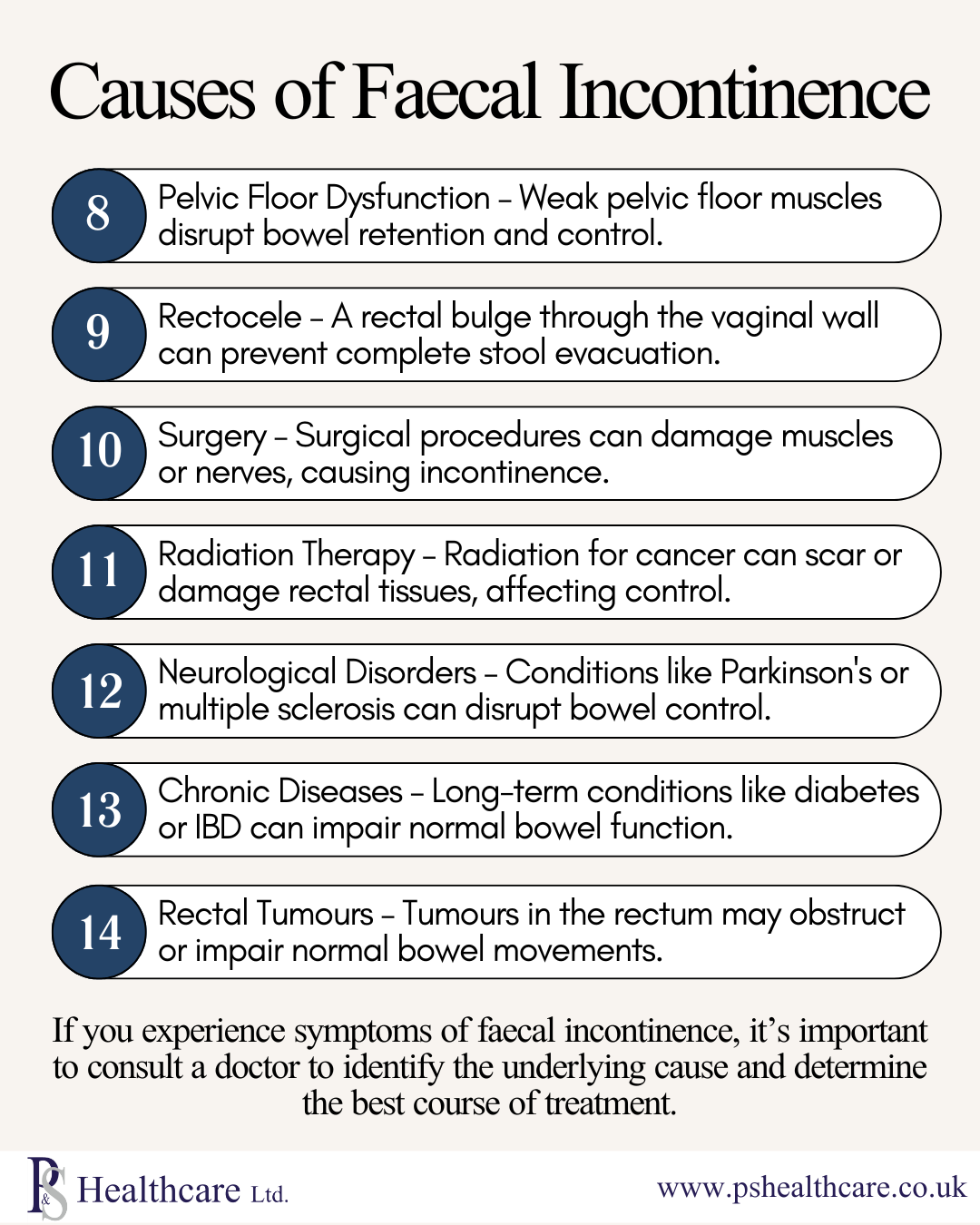Causes of Faecal Incontinence

Faecal incontinence, or the inability to control bowel movements, can be a distressing and embarrassing condition. It affects people of all ages and can range from occasional leakage to a complete loss of control over the bowels. The causes of faecal incontinence vary widely, often involving complex interactions of medical, physical, and lifestyle factors. Below are the primary causes of faecal incontinence:
1. Muscle Damage
The muscles that control bowel movements, known as the anal sphincters, may be damaged or weakened. This damage can result from childbirth (especially in cases of a difficult delivery), surgery, or trauma. When these muscles are unable to close properly, it can lead to involuntary leakage of stool.
2. Nerve Damage
The nerves that control the anal sphincter and rectum play a crucial role in bowel control. If these nerves are damaged, it can impair the ability to sense when the bowel is full or to control the muscles of the rectum and anus. Nerve damage can occur as a result of spinal cord injury, stroke, diabetes, or multiple sclerosis.
3. Diarrhoea
Chronic or severe diarrhoea can overwhelm the body's ability to control bowel movements. Loose or watery stools are harder to retain, and frequent bowel movements increase the risk of accidental leakage. This condition is often linked to digestive disorders such as irritable bowel syndrome (IBS), Crohn’s disease, or infections.
4. Constipation
Although it might seem counterintuitive, severe constipation can cause faecal incontinence. Chronic constipation can lead to a buildup of hard stool in the rectum, which stretches and weakens the muscles over time. As the muscles become less effective, liquid stool may leak around the hardened mass, leading to incontinence.
5. Rectal Prolapse
Rectal prolapse occurs when the rectum drops down through the anus, usually due to weakened pelvic muscles or repeated straining during bowel movements. This condition can stretch the nerves and muscles involved in bowel control, making it difficult to retain stool.
6. Aging
As people age, the muscles and nerves responsible for bowel control may weaken, making faecal incontinence more common in older adults. Age-related weakening of the pelvic floor, reduced rectal elasticity, and slower reflexes can all contribute to the condition.
7. Childbirth Injuries
Women are particularly susceptible to faecal incontinence due to injuries sustained during childbirth. Difficult deliveries, forceps use, or the need for an episiotomy (a surgical cut during delivery) can lead to damage in the anal sphincter or the pelvic floor muscles. The effects may not appear until later in life, particularly during menopause.
8. Pelvic Floor Dysfunction
The pelvic floor consists of muscles and connective tissue that support the bladder, uterus, and rectum. Pelvic floor dysfunction, which includes weakened muscles or nerve damage, can lead to faecal incontinence. This condition may result from childbirth, surgery, or long-term straining due to constipation.
9. Rectocele
A rectocele occurs when the rectum bulges through the vaginal wall, usually as a result of weakened pelvic muscles or tissue. This condition can affect the ability to fully evacuate stool, increasing the likelihood of leakage.
10. Surgery
Certain surgeries, especially those involving the rectum or pelvic area, can lead to faecal incontinence as a complication. Surgical procedures for haemorrhoids, cancer, or inflammatory bowel disease (IBD) can sometimes damage the sphincter muscles or surrounding nerves, resulting in a loss of bowel control.
11. Radiation Therapy
Radiation therapy for cancer, particularly in the pelvic region (such as for prostate or rectal cancer), can cause scarring and damage to the rectal tissues and nerves. This can lead to a weakening of bowel control and increase the risk of faecal incontinence.
12. Neurological Disorders
Conditions that affect the brain and spinal cord, such as Parkinson’s disease, dementia, or multiple sclerosis, can interfere with the nerve signals that control bowel movements. This disruption can make it difficult to control the sphincter muscles and lead to involuntary bowel leakage.
13. Chronic Diseases
Chronic diseases such as diabetes, inflammatory bowel disease (IBD), and celiac disease can cause ongoing digestive issues and lead to faecal incontinence. In some cases, these diseases can cause nerve damage or digestive complications that interfere with normal bowel function.
14. Rectal Tumours
Tumours or growths in the rectum, whether benign or malignant, can obstruct normal bowel movements or damage the muscles and nerves that control the anus. This can result in both difficulty in evacuation and leakage of stool.
Faecal incontinence can result from a wide range of factors, from muscle and nerve damage to chronic diseases and certain medications. If you experience symptoms of faecal incontinence, it’s important to consult a doctor to identify the underlying cause and determine the best course of treatment. Effective management options are available, depending on the cause and severity of the condition.
Don't forget to download our handy infographic, below


More News:
- Choosing the Right Children's Nighttime Pants and Daytime Solutions
- How to Choose the Right Incontinence Supplies for Men Over 50
- Christmas Confidence
- Real Women, Real Stories: Living Confidently with Washable Incontinence Pants
- A Real-Life Guide to Incontinence Bed Sheets & Washable Bed Pads
- The Environmental Benefits of Reusable Bedwetting Pants for Kids
- Men's Washable Incontinence Pants for Everyday Confidence: A User's Guide
- Top Features to Look for in Washable Incontinence Pants for Women
- 5 Mistakes to Avoid When Washing Your Reusable Incontinence Bed Pads
- The Best Bedwetting Pants for Children: What Parents Need to Know
- Male Washable Incontinence Pants vs. Disposable: Which Is Better?
- The Best Incontinence Pants for Women
- The Complete Guide to Washable Bed Pads & Incontinence Products
- How to Talk to Your Child About Incontinence: Supportive Parenting Strategies
- Incontinence Supplies for Men: What You Actually Need
- Washable Incontinence Pants for Women: A Comfortable, Eco-Friendly Solution
- Children's Incontinence Pants: How They Help Kids Stay Dry and Confident
- Why More Men Are Switching to Washable Incontinence Pads and Pants
- Managing Incontinence as a Woman: Tips for Travel, Work, and Home Life
- The Best Washable Incontinence Pants in the UK
- Real Stories from Families Using Children's Nighttime Pants
- Caring for a Loved One? A Carer's Guide to Incontinence Supplies for Men
- Why Ladies Washable Incontinence Pants Are Better for the Planet
- Understanding Why Older Children Still Wet the Bed and What You Can Do About It
- Travelling with Incontinence: Best Washable Incontinence Pants for Men on the Go
- Your Guide to Washable Incontinence Pants for Ladies: FAQs Answered
- The Benefits of Switching to Washable Incontinence Products
- 8 Everyday Activities That Can Strengthen or Weaken Your Bladder
- 10 Things You Should Pack in an Incontinence Emergency Kit
- 10 Foods to Eat and Avoid for Better Bowel Control
- 8 Ways Stress and Anxiety Can Affect Bladder Health
- 10 Signs It's Time to See a Doctor About Your Urinary Incontinence
- 10 Tips for Talking to Your Child About Bedwetting
- 10 Things You Should Know About Postpartum Incontinence
- 10 Common Triggers of Urinary Incontinence in Women Over 50
- 10 Tips for Night-Time Incontinence Management in Adults
- 10 Ways to Manage Incontinence While Playing Sports
- Your Incontinence Options: Finding the Right Solution for You
- 10 Tips for Managing Faecal Incontinence in Adults
- 10 Lifestyle Changes to Manage Urinary Incontinence Symptoms
- 10 Ways to Manage Urinary Incontinence During Pregnancy
- 10 Causes of Urinary Incontinence in Men and How to Treat Them
- 10 Practical Solutions for Coping with Incontinence at Work
- 10 Myths About Menopause and Incontinence You Should Stop Believing
- 10 Foods to Avoid to Prevent Bladder Irritation and Incontinence
- 10 Effective Pelvic Floor Exercises for Urinary Incontinence
- 10 Common Causes of Bedwetting in Children and How to Address Them
- Causes of Faecal Incontinence
- Breaking the Silence: Managing Incontinence with Confidence
- Supporting Loved Ones with Incontinence: A Caregiver's Guide
- Top 10 Tips for Managing Incontinence Comfortably This Christmas
- Pregnancy and Postpartum Incontinence: Prevention and Recovery
- 10 Random Facts About Pee You Probably Didn't Know
- Diet and Bladder Health: Foods That Help and Hurt
- Helping Your Child Manage Incontinence: A Parent's Resource
- The Most Common Bladder Control Problems and How to Manage Them
- 10 Things That Can Make Incontinence Worse
- Incontinence Myths vs Facts - Dispelling Common Misconceptions
- Top 10 tips to help with bladder control during pregnancy
- 10 Effective Ways to Stop Bladder Leaks & Manage Incontinence
- P&S Washable Face Mask with ViralOff
- New Product For Men - The Slip Brief
- New Monthly Protection Briefs For Women
- New Product - The OooPS Pant for Stress Incontinence
- New Adult Inco-elite Range Launched
- EMDA WOMEN OF WORTH AWARD 2009
- New Website Launched
- New Website Under Development

